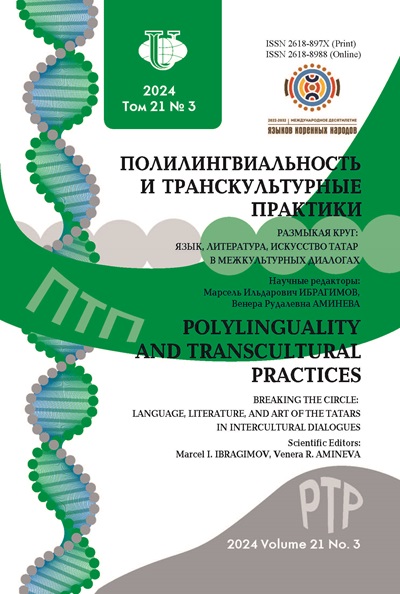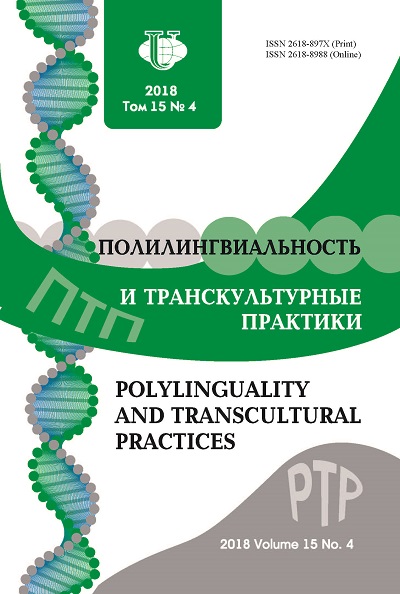Terms of Address in Hong Kong Variety of the English Language (Based on Analysis of “A Dictionary of Hong Kong English”)
- Authors: Bekisheva Y.V1, Il’ina S.S1
-
Affiliations:
- Far Eastern Federal University
- Issue: Vol 15, No 4 (2018)
- Pages: 501-517
- Section: Languages in contact
- URL: https://journals.rudn.ru/polylinguality/article/view/20239
- DOI: https://doi.org/10.22363/2618-897X-2018-15-4-501-517
Cite item
Full Text
Abstract
Among the great number of functions that forms of address perform are the following: to attract attention of the person one wants to speak to, to express the addresser’s attitude to the addressee, to remind of the spiritual relations between the speakers, to empathize the speakers’ professional status, and many others. Within the boundaries of the World English theory, study of the forms of address used by speakers of East Asian Englishes is supposed to prove that these terms reflect the cultural identity which is expressed by means of the variety of the English language these speakers use. By means of observation, descriptive and quantitative analysis methods, the authors of the article analyze forms of address used in Hong Kong English. Our previous classification of the forms of address used in Hong Kong English was made on the basis of the questionnaire analysis conducted in Hong Kong [1] and it made it possible for us to single out 6 major groups of forms of address in Hong Kong English: 1) kinship terms of address; 2) forms of address used to strangers; 3) forms of address used by friends and acquaintances; 4) forms of address to people of certain professions; 5) forms of address to animals; 6. unique forms of address. This article is the result of analysis of direct and indirect forms of address presented in “A Dictionary of Hong Kong English”. Now, forms of address are classified into 7 major groups with the forms of address empathizing the addressee’s national identity, insulting forms of address, and Hong Kong traditional forms of address among them. Forms of address presented and analyzed in this article prove our hypothesis that greatly influenced by Cantonese, English spoken in Hong Kong is the reflection of the cultural identity of its speakers.
About the authors
Yuliya V Bekisheva
Far Eastern Federal University
Author for correspondence.
Email: julia.bekisheva@gmail.com
Assistant of the Academic Department of English at the Eastern Institute - School of Regional and International Studies
8, Sukhanova str., Vladivostok, 690091, Russian FederationSvetlana S Il’ina
Far Eastern Federal University
Email: svilyina@mail.ru
PhD in Philology, Associate Professor of the Academic Department of English at the Eastern Institute - School of Regional and International Studies
8, Sukhanova str., Vladivostok, 690091, Russian FederationReferences
- Kabakchi, V.V. 1993. Angliiskii yazyk mezhkul’turnogo obshcheniya [The English Language of Cross-cultural Communication].Saint Petersburg: Obrazovanie. Print. (In Russ).
- Proshina, Z.G. 2004. Perekrestok: Anglo-russkii kontaktologicheskii slovar’ vostochnoaziatskoi kul’tury [Cross-road: English — Russian Contactology Dictionary of East Asian Culture]. Vladivostok: Dal’nevostochniyi universitet. Print. (In Russ).
- Kachru, B. 1998. English as an Asian Language. Links & Letters 5. Print.
- Platt, J.T., H. Weber, and Ho L.M. 1984. The New Englishes. London, Melbourne & Henley: Routledge & Kegan Paul. Print.
- Kachru, B. 1986. The Alchemy of English: The Spread, Functions and Models of Non-Native Englishes. Oxford: Pergamon Press. Print.
- Proshina, Z.G. 2001. Angliiskii yazyk I kul’tura narodov Vostochnoi Azii [The English Language and Culture of East Asia Nations]. Vladivostok: Dal’nevostochniyi universitet. Print. (In Russ).
- Kachru, B. 1986. The Power and Politics of English. World Englishes 5 (2/3). Print.
- Kachru, B. 1992. Teaching World Englishes. In B. Kachru (ed.) The Other Tongue: English Across Cultures (2nd ed.) Urbana & Chicago: University of Illinois Press. Print.
- Pandharipande, R.V. 1987. On Nativization of English. World Englishes 6 (2). Print.
- Berns, M. 2005. Expanding on the Expanding Circle: Where Do WE Go from There? World Englishes 24 (1). Print. https://doi.org/10.1111/j.0883-2919.2005.00389.x
- Evans, S. 2011. Hong Kong English and the Professional World. World Englishes 30 (3). Print. https://doi.org/10.1111/j.1467-971x.2011.01655.x
- Bolton, K. 2000. The Sociolinguistics of Hong Kong and the Space for Hong Kong English. World Englishes 19 (3). Print.https://doi.org/10.1111/1467-971x.00179
- Chan, Jim Y.H. 2013. Contextual Variation and Hong Kong English. World Englishes. Vol. 32 (1). Print.https://doi.org/10.1111/weng.12004
- Setter, J., C. Wong, and Chan B. 2010. Hong Kong English. Edinburgh University Press. Print.
- Cummings, P.J., and H-G. Wolf. 2011. A Dictionary of Hong Kong English. Words from the Fragrant Harbor. Hong Kong University Press. Print.
- Kabakchi, V.V., and Z.G. Proshina. 2012. “V chuzhoi monastyr’ so svoim lingvokul’turnym ustavom: obrashchenie” [Into Foreign Monastery with own Cultural Typicon: Terms of Address]. Lichnost’, Kul’tura. Obshchestvo 14 (1): 69—70. Print. (In Russ.)
- Kurilova, K.A. 1999. Obrashcheniya v sovremennom kitaiskom yazyke (k voprosu o rechevom etikete kitaitsev) [Terms of Address in Modern Chinese (revisiting the Chinese Speaking Etiquette)]. Vladivostok: Dal’nevostochniyi universitet. Print. (In Russ).
- Il’ina, S.S. 2007. Obrashcheniya v singapurskom variante angliiskogo yazyka [Terms of Address in Singapore Variant of the English Language]. Vladivostok: Dal’nevostochniyi universitet. Print. (In Russ).
- Brown, R., and M. Ford. 1972. Address in American English. In Laver, J., S. Hutchetson. Communication in Face-to-Face Interaction. Harmondsworth: Penguin. Print.
- Jia, Y. 1999. Interpersonal Relationship and Intercultural Communication: East and West. Aspects of Intercultural Communication. Proceedings of China’s 2nd Conference on International Communication. Print.
- Rozental’, D.E., and M.A. Telenkova. 1985. Slovar’-spravochnik lingvisticheskikh terminov [Dictionary — Book of Reference of Linguistic Terms]. Moscow: Prosveshchenie. Print. (In Russ).
- Tarasov, E.F., and Yu.A. Sorokin. 1977. Natsional’no-kul’turnaya spetsifika rechevogo I nerechevogo povedeniya [National-cultural Specific of Verbal and Non-verbal Behavior]. Moscow: Nauka. Print. (In Russ).
- Lendel, Zh. 1977. “Obrashcheniya, privetstviya I proshchaniya v rechevom etikete sovremennykh vengrov” [Terms of Address, Greetings and Good-byes in Speaking Etiquette of Modern Hungarians] in Natsional’no-kul’turnaya spetsifika rechevogo povedeniya. Moscow: Nauka. Print. (In Russ).
- Skorbatyuk, I.D. 1977. “Nekotorye aspekty vyrazheniya form vezhlivosti v koreiskom yazyke” [Some Aspects of Expression Forms of Politeness in the Korean Language] in Natsional’nokul’turnaya spetsifika rechevogo povedeniya. Moscow: Nauka. Print. (In Russ).
- Gann, G. 1994. “Terminologiya rodstva v lingvisticheskom I natsional’no-kul’turnom aspektakh: (na material sovremennogo kitaiskogo yazyka i sovremennogo russkogo yazyka)” [Terminology of Relationship in Linguistic and National-cultural Aspects (Based on Materials of Modern Chinese and Russian languages). PhD Thesis. Moscow. Print. (In Russ).
- Sternin I.A., T.V. Larina, and Sternina M.A. 2003. Ocherk angliiskogo kommunikativnogo povedeniya [Study of English Communication Behavior]. Voronezh: Istoki. Print. (In Russ).
- Maiol, E., and D. Milsted. 1999. Eti strannye anglichane [These Strange Englishmen]. Moscow, Egmont Rossiya Ltd. Print. (In Russ).
- Mitali, S. 2001. “Obrashchenie kak element russkogo rechevogo etiketa v sravnenii s bengal’skim” [Terms of Address as a Part of Russian Speaking Etiquette in Comparison with Bengali]. PhD Thesis. Moscow. Print. (In Russ).
- Tarasov, E.F. 1996. Mezhkul’turnoe obshchenie — novaya ontologiya analiza yazykovogo soznaniya [Intercultural Communication — New Ontology of Linguistic Consciousness Analysis]. Moscow: IYaRAN. Print. (In Russ).
- Bekisheva, Y.V., and S.S. Il’ina. 2017. “Obrashcheniya v gonkongskom variante angliiskogo yazyka (na material provedennykh oprosov zhitelei Gonkonga)” [Terms of Address in Hong Kong Variant of the English Language (based on the interviewing of Hong Kong citizens] in Problemy, perspektivy I napravleniya innovatsionnogo razvitiya nauki Proceedings. 08 July, Perm’. Ufa: Omega-Sains Publ. Print. (In Russ).















